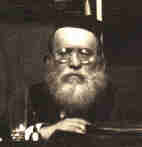 |
Hadrash Ve-Haiyunby the Reisha Rav, HaGoan Rav Aaron LevineElucidated and Adapted by Efraim Levine |
 |
Hadrash Ve-Haiyunby the Reisha Rav, HaGoan Rav Aaron LevineElucidated and Adapted by Efraim Levine |
Yisro
Dedicated in Memory of Dovid Rothstien z"l
To Dedicate Please Contact Hadrash Ve-Haiyun
The father-in-law of Moshe saw everything that he (Moshe) was
doing to the people and he said, "What is this thing that
you are doing to the people?" Why do you sit alone with all
the people standing by you from morning to evening?"
Moshe said to his father in law "Because the people come
to me to seek Hashem. When they have a matter one
comes to me and I judge between a man and his fellow, and
I make known the statutes of Hashem and his laws."
(Shemos 18:14-16)
The simple understanding of the posukim is that Yisro questioned Moshe why he sits alone in judgment. The workload is too much for a single man to bear. To this Moshe responded that people have many questions and disputes and it is his duty to answer their questions and resolve their disputes.
We may ask a number questions. If Yisro was bothered only because Moshe sat alone, why then did he mention that he observed him sitting from morning to evening? How did Moshe answer his question? Is it not obvious that the people have many questions? Why the verbosity in Moshe response? What did Moshe's mean by breaking up his response that some people come to seek Hashem while others come for dispute resolution?
Let us suggest a homiletic interpretation to this dialogue. First let us suggest that Yisro's main question was not why Moshe sat alone but why there was so many questions that necessitated Moshe to sit in judgment from morning to evening. To this Moshe responded that the problem is not because they have many questions but, on the contrary, it is because they failed to ask the questions at the proper time. Let us explain.
Moshe explained that there are two types of questions that he dealt with. The first type are those that related to mitzvos between man and Hashem. Moshe referred to these questions with the words "the people come to seek Hashem." Then there are the second category of questions, those that relate to mitzvos between man and man. This he referred to with the words "and I judge between a man and his fellow."
However there is a big difference between the two. When the people attempt to do a mitzvah between man and Hashem before actually doing the mitzvah they are careful to clarify any uncertainties that they have. But unfortunately when engaging in some activity with their fellow man they fail to clarify if their conduct meets the standards of the Torah. Here they are willing to take the risk and proceed without resolving their uncertainties. In this category of questions I only receive them after they are too deeply involved and the problem has gotten out of hand. This difference is alluded to in the posuk when in mentioning the mitzvos between man and Hashem Moshe says simply they come to seek Hashem. Whereas with regard to judging between man and his fellow, Moshe prefaced his words with the phrase "when they have a matter." This implies they don't get to me until it is a matter, i.e., it is too late and the matter has already gotten out of hand. If they would have only come to me before getting involved with their fellows and sought proper Torah guidance, it would never have come to such a situation were I would need to sit in judgment from morning to evening with so many individuals.
With this idea we can understand why Moshe was still judging them all alone. Moshe believed that it was possible for them to still come to the level of treating the mitzvos between man and man just as they would act with mitzvos between man and Hashem. If he would succeed in accomplishing this that would drastically diminish the number of disputes and there would be no need for more judges. However Yisro responded "this matter is heavier than you." To teach the people to treat the mitzvos between man and man with the same level of exactness as the mitzvos of man and Hashem is beyond the ability of a single man, even one like Moshe.